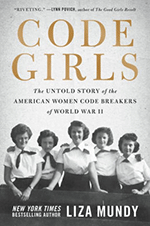How women's colleges helped win World War II

Author Liza Mundy speaks about the role of women in coded communications at the ASU+GSV Summit 2018 in San Diego on Monday. Mundy’s book, "Code Girls: The Untold Story of the American Women Code Breakers of World War II," shares the story of college women and teachers being recruited for the clandestine work. Photo by Charlie Leight/ASU Now
Editor's note: Read more of the highlights from the ASU + GSV Summit on our blog.
Monday at the ASU + GSV Summit, author Liza Mundy gave the audience a history lesson tied to her book “Code Girls: The Untold Story of the American Women Code Breakers of World War II.” A partial transcript follows:
"World War II was a time when the freedom of democracy hung in the balance, and diversity and a willingness to be inclusive was truly a reason we won World War II.
"Much of our tech industry was born during World War II. It was really women doing that work because the men were doing the fighting.
"Goucher College was a women’s college founded in the 19th century when people thought higher education for women was a bad thing. It was a rigorous institution, but there was enormous pressure on the women to get married. One of the women from Goucher was Jackie Jenkins, mother of Bill Nye the Science Guy, so you get a sense of her intellectual chops.
"She had been tapped by the U.S. Navy and spent weekends being ushered into an arcane field called cryptanalysisCryptanalysis is the study of ciphertext, ciphers and cryptosystems in order to understand how they work and find ways to defeat them.. She was one of thousands.
"Everything took place over the radio waves using Morse code. We had to figure out how to break those. Americans had led code-breaking responsibility for the Pacific Ocean.
"A bureaucrat in the U.S. Navy literally typed in a memo: “New source: women’s colleges.”
"They (female candidates) were asked two questions: “Do you like crossword puzzles?” and “Are you engaged to be married?” If they said yes and no (respectively), they were recruited.

"The Army sent their handsomest soldiers to do the recruitment because they thought these women would be susceptible to the charms of a young man and that’s why they would take this work. They were so wrongheaded about why an educated woman would want a way to do work.
"Thousands of schoolteachers from the South learned the geography of Asia and the code systems of the ships supplying the Japanese army, spread out on islands all around the Pacific. They were trained to read an encrypted message, and they were doing an early form of hacking.
"There was an African-American unit breaking the code of the private sector. They were also former teachers. Just as banks and companies do today, encrypting all their financial info before sending it out on the internet, banks and companies were doing that in World War II. They were figuring out who was doing business with Hitler or Mitsubishi.
"I interviewed 20 women for the book and have heard from many more. They had to do complicated math to strip out the encryption. The intelligence would go out to American submarine commanders waiting on the horizon.
"We sank thousand and thousands of Japanese ships. Most Japanese army deaths were from starvation and disease because they weren’t getting supplies.
"When they learned that their efforts led to a convoy being sunk, these women felt pure satisfaction. Later in their lives they had more complicated feelings about the lethal intelligence work they were part of.
"They made an incredible contribution to the end of World War II. Our willingness to innovate, and be diverse when freedom hung in the balance, was a central reason we won World War II."